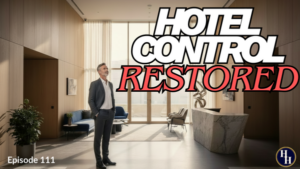Discover how mastering the art of active listening can dramatically elevate your guests experience and satisfaction levels.
One of the great cornerstones of success in the hotel industry today involves effective communication to enhance the guest experience. This episode attempts to learn from “real-world examples in hotel communication” and adds meaningful perspectives and useful strategies that you as an owner can act on to make experiences for your guests excellent.
Active Listening to Understand Your Guests’ Needs
Active listening is not only a skill but also one of the greatest components that make effective communication in a hotel. It involves paying full attention to understanding, responding, and remembering what the guest said. It’s a major way to increase guest satisfaction greatly since they feel valued and understood. For example, I was travelling with a colleague in Boston, and at a property we were staying he casually mentioned to a staff member that he loved running in the evening. That evening, when he arrived back in his room, he found a map with a route marked out, and a water bottle waiting for him. A great example of active listening leading to personalized service.
Learn to Customize Communication Styles
All visitors are persons, and every one of them has a different persona that could make communication effective. For example, the business traveller has needs and expectations different from those of a leisure traveller. The business traveller is most likely going to appreciate brief and straight-to-the-point types of communications, including Wi-Fi and work facilities. The traveller on leisure will, however, appreciate lengthy forms of communication, including the details of the amenities that vary from relaxation to local attractions and entertainment.
Technology-Driven Communication Transformation
This has completely revolutionized the communication aspect of the hospitality industry. Solutions can be anything from mobile applications for in-and-out hotel registration to chatbots for instant guest queries. An example would be an application, where a guest can pay for his check-in to a hotel, choose their room, and unlock its door from their smartphone. This would ease communication with hotel staff in the simplest way possible.
Develop a Culture of Giving Feedback
Invite feedback. Provide multiple channels for guests to provide their feedback, be it through digital forms, in person during checkout, or follow-up emails post-stay. Actively looking for, and more critically, acting on this feedback shows dedication to outstanding service. For example, if there are several guests who recommend that the breakfast variety should be improved, then improving the menu would considerably increase the satisfaction of the guests and go a long way in demonstrating that you value guest input.
Regularly Train Your Staff
Continuous training programs for staff would help instil effective practices in communication. It could also provide them the ability to cope with scenarios of the different types of guests in a professional manner. Role-playing, and simulating real-life situations at the front desk, would be useful exercises. Training gives confidence among the staff members, which is reflected in guest service.
Create Personalized Guests Experience
It is important to personalize your guests experience, like remembering the little things from guests’ names to knowing their preferences from a previous stay. An example could be the welcoming of a repeat customer with their favourite drink or upgrading their accommodation free of charge, if available.
Make the Human Touch Relevant
Ensure that your staff communicates internally as well. Internal communication will help staff know what is happening and make sure that guest needs are taken care of at the right moment. Internal chat application tools or fast daily briefings can keep everybody in the loop and avoid the misfiring of services.
Imagine having a treasure trove of hotel management wisdom at your fingertips. That’s what you get with our guide, ‘Unlocking Hospitality Success: 25 Must-Know Insights for Independent Hotel Owners’. It’s your blueprint for building a standout hotel that guests can’t resist. Seize this chance to redefine hospitality on your terms. Download your free guide from the link in the show notes and start making waves in the hotel industry today!
Have you ever found yourself in a situation where any of the mentioned communication strategies were not working in your hotel?
In Conclusion
As highlighted, effective communication in hotels can personalize interactions with relevant strategies and enhance guest experience. It involves more than simply transmitting information, it is about building relationships that make each guest’s stay memorable. By emphasizing these key aspects, you can elevate your hotel services to new heights.
In the next episode, I will talk about Simplifying Communication To Boost Your Hotel’s Efficiency.
⇒ TO READ OR LISTEN TO THIS EPISODE ON KEYSTONE HOSPITALITY PROPERTY DEVELOPMENT
Serious about taking your business to the next level? Sign up for the “Check-In to Success-Building and Running Your Hotel Business” course
.
Grab your copy of the “Unlocking Hospitality Success: 25 Must-Know Insights for Independent Hotel Owners” PDF
hotelierhelpcast.com/success-25-must-know-insights-for-independent-hotel-owners-download
.
Join our groups
.
Listen to The Hospitality Property School PODCAST here
.
YouTube Channel
Gerry MacPherson
Say hi on social…
A Division of Keystone Hospitality Property Development
How to Regain Hotel Operations Control in Your Independent Hotel-111
The Psychology of the Hotel Repeat Guests: What Really Brings Them Back?-110
Are You Working On Your Hotel Business or Just In It?-109
- 1
- 2
- 3
- 4
- …
- 37
- Go to the next page






